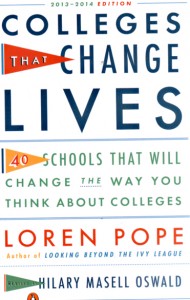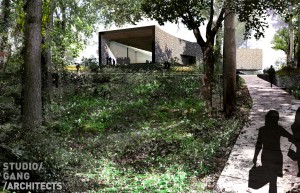 “If you were to build your own liberal arts college, you’d look closely at Kalamazoo College for ideas about how to do it. That’s because other colleges offer some of the same distinctive features you’ll find at Kalamazoo, but few integrate all of them so thoughtfully to create life-changing experiences.”
“If you were to build your own liberal arts college, you’d look closely at Kalamazoo College for ideas about how to do it. That’s because other colleges offer some of the same distinctive features you’ll find at Kalamazoo, but few integrate all of them so thoughtfully to create life-changing experiences.”
So begins the chapter on Kalamazoo College in the 2013-14 edition of “Colleges that Change Lives: 40 Schools that Will Change the Way You Think about College.”
Colleges That Change Lives (Penguin Books; ISBN: 9780143122302 On-Sale Date: August 28, 2012; 352 pages; $17.00) was first published in 1996 by Loren Pope, former education editor of the New York Times. Pope was also the founder of the College Placement Bureau, a college administrator, and the author of “Looking Beyond the Ivy League.”
Pope published updates to his book in 2000 and 2006. He died in 2008.
The fourth and most recent edition has been updated by Hilary Masell Oswald a journalist who writes about education, architecture and design, and public policy. Her work has appeared in Newsday, the Chicago Tribune, Edutopia, and other publications and websites.
She anticipates the questions that prospective students and their parents will have and provides the answers. Topics include:
• The look and feel of the campus
• Quality of dining hall food
• Percentage of students who study abroad
• Percentage of students who go to grad school
• Average SAT/ACT scores
• What professors have to say about their schools
“We are thrilled to be included once again in Colleges That Change Lives,” said Kalamazoo College Dean of Admissions and Financial Aid Eric Staab. “Prospective students and their parents have more than 4,000 colleges and universities in the United States to choose from. This book helps them cut through the clutter and move beyond the ratings and rankings to find a college that is a good, affordable fit.”
Kalamazoo College has been included in each of the book’s four editions. Other colleges in the fourth edition include Allegheny (Pa.), Beloit (Wis.), Clark (Mass.), Hendrix (Ark.), Rhodes (Tenn.), Southwestern University (Texas), and University of Puget Sound (Wash.). Hope College and, for the first time, Hillsdale, are the only other Michigan schools included.
Oswald, as did Pope before her, visited K’s campus to conduct extensive interviews with students, faculty and staff.
She cites characteristics of the K-Plan —the College’s multilayered academic program—as a key to K’s success. These include a solid liberal arts curriculum, study abroad, experiential learning opportunities such as service-learning and leadership development, and a Senior Individualized Project.
“The K-Plan makes so much sense,” says Professor of Biology Binney Girdler in the book. “The first two years are the students’ foundation. The third year, they go far. The fourth year, they go deep. By the end of their time here, we’re willing to coauthor papers with them. That transformation—I’ll never get tired of it.”
According to Oswald, “What happens to students here is remarkable,” and K faculty members are a big reason why. “Over and over again,” she says, “students rave about their teachers, even as they complain about the amount of work. That’s a sign of good teaching.”
As proof a value for a Kalamazoo College education, Oswald cites Collegiate Learning Assessment (CLA) test results. CLA tests freshmen and seniors for their critical thinking, analytical reasoning, problem solving, and written communications skills.
“CLA examiners compare results across a variety of four-year colleges to answer the question: Are student really learning anything?” writes Oswald. “At Kalamazoo they are. CLA said the students performed well above expected.”
Dean of Students Sarah Westfall describes the K student body: “We have a student body of individuals. There’s very little herd mentality. They feel a call to activism and learning, but they’re also garden variety kids—some from small towns, working-class families, and a good number are first-generation college kids.”
Oswald concludes her chapter on Kalamazoo College with her own observation about its students by saying they are “enthusiast about their learning and thoughtful about their responsibilities to their community. A few conversations with current students will convince you that Kalamazoo’s component parts are remarkable, but if ever there were a place where the effect is greater than the sum of its parts, that place in Kalamazoo College.”
K is a proud partner of CTCL Inc., a nonprofit organization dedicated to the advancement and support of a student-centered college search process. Separate from the book, CTCL Inc. works to dispel publicly held myths about college choice by hosting information sessions nationwide and coordinating outreach efforts with high school counselors and college counseling agencies.
Founded in Kalamazoo, Mich., in 1833, Kalamazoo College (www.kzoo.edu) is a nationally recognized liberal arts college and the creator of the K-Plan that emphasizes rigorous scholarship, learning by practice, leadership development, and both international and intercultural engagement. Its 1,400 students hail from 30 states and 24 countries. Kalamazoo College does more in four years, so students can do more in a lifetime.



